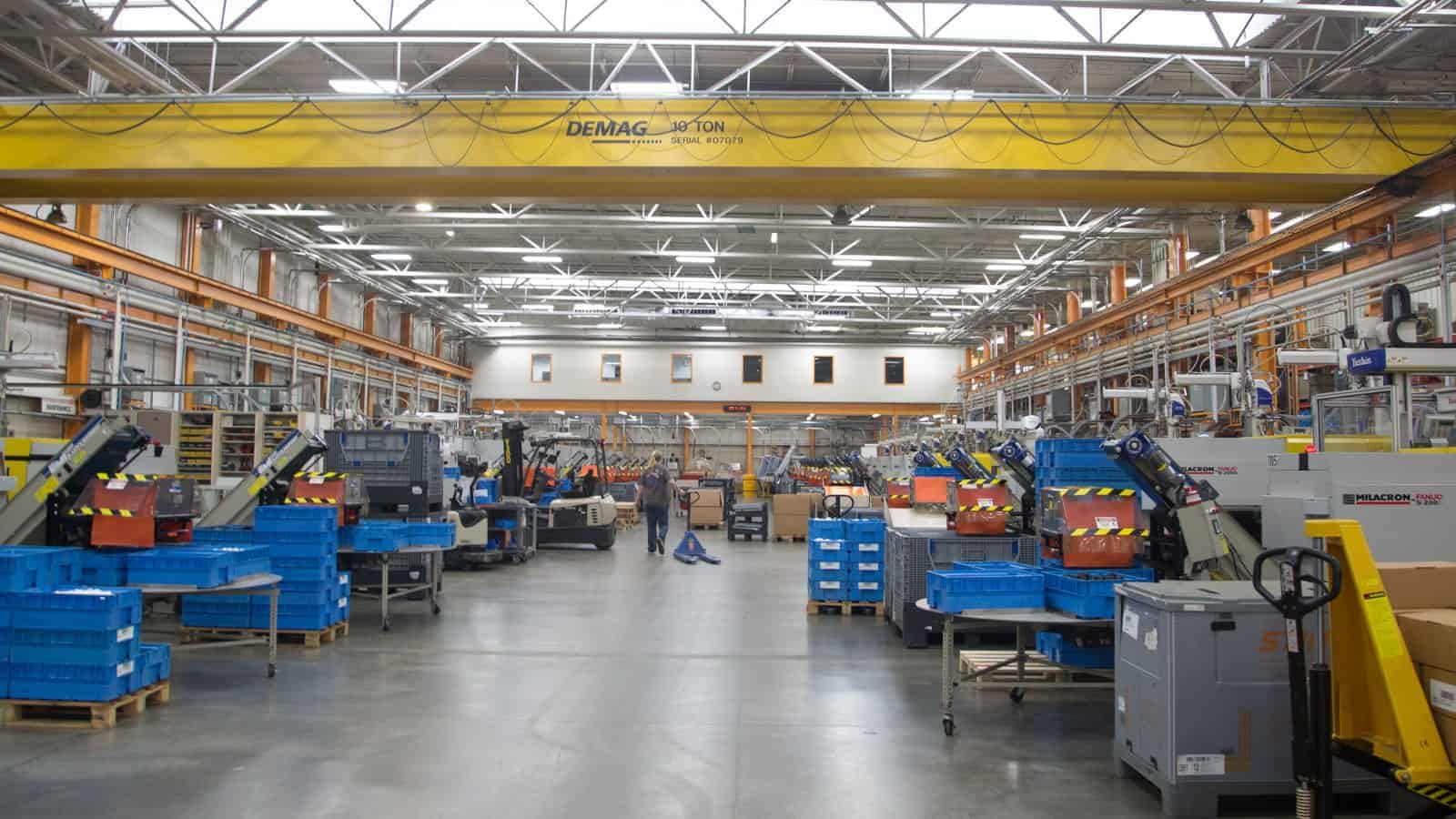Manufacturers Need WOTUS Proposal That Provides Permitting Certainty
Manufacturers cannot invest with confidence when the rules keep changing
Washington, D.C. – Following the release of the Environmental Protection Agency’s proposed new Waters of the United States rule, National Association of Manufacturers Senior Vice President of Policy and Government Relations Aric Newhouse issued the following statement:
“The EPA is unnecessarily rewriting critical permitting standards and tossing aside Supreme Court precedent in the process. This moving target frustrates efforts to expand domestic manufacturing and create well-paying jobs. Manufacturers cannot invest with confidence when the rules keep changing.
“Manufacturers need a sensible WOTUS proposal that provides permitting certainty and allows the industry to continue leading on environmental stewardship.”
In 2023, the Supreme Court is expected to issue a decision in Sackett v. EPA, a case that will determine the jurisdiction of the Clean Water Act and all regulations within its authority. Previously, the NAM submitted multiple sets of comments regarding the 2015 WOTUS rule to better inform policymakers. In addition, the NAM supported the 2017 executive order instructing the EPA to rescind the rule, and the NAM Legal Center had been in active litigation against the rule starting in 2015. The legal battle included a unanimous victory for the NAM at the U.S. Supreme Court on a key procedural issue, and in 2019, federal judges invalidated the rule.
-NAM-
The National Association of Manufacturers is the largest manufacturing association in the United States, representing small and large manufacturers in every industrial sector and in all 50 states. Manufacturing employs more than 12.9 million men and women, contributes $2.77 trillion to the U.S. economy annually and accounts for 55% of private-sector research and development. The NAM is the powerful voice of the manufacturing community and the leading advocate for a policy agenda that helps manufacturers compete in the global economy and create jobs across the United States. For more information about the NAM or to follow us on Twitter and Facebook, please visit www.nam.org.
NAM, KAM Win on SEC Bond Rule Interpretation
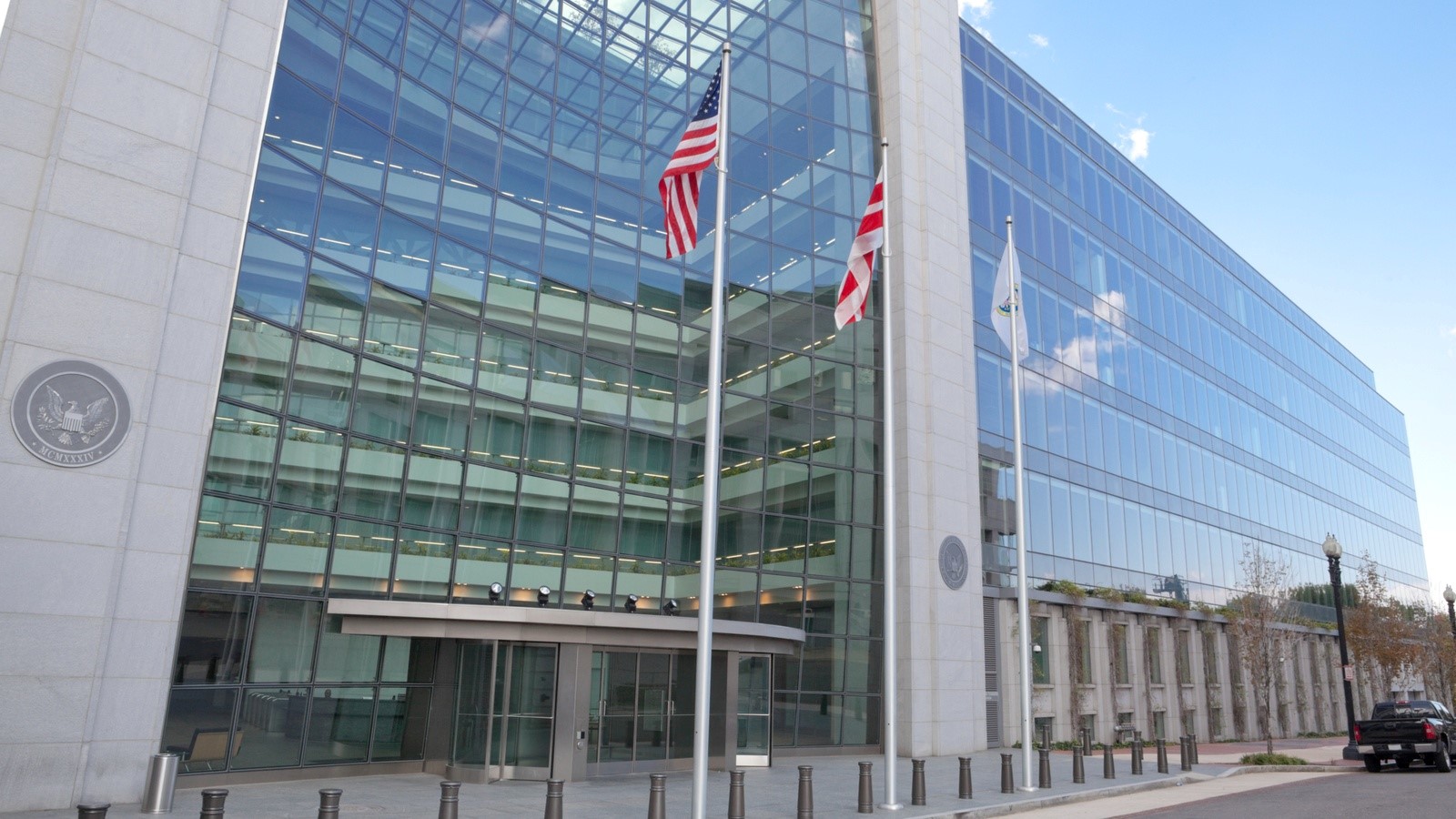
In response to advocacy by the NAM and the Kentucky Association of Manufacturers, the Securities and Exchange Commission has granted privately held companies temporary relief from a punishing new rule interpretation that would have required them to expose confidential financial information to the public.
The background: In 2020, the SEC finalized a rule designed to increase disclosure obligations for companies issuing over-the-counter equity securities (“penny stocks”). The following year the SEC published a new interpretation of the rule, to take effect in January 2023, which broadened the disclosure requirement to include private companies issuing corporate bonds.
- Late last month, following an emergency petition for interim relief from the NAM and the KAM, the SEC granted a two-year stay of the new interpretation—so private companies will not face the new public disclosure obligations until January 2025.
- Corporate bonds can only be purchased by large institutional investors (which already have access to issuers’ financial information), not retail investors, so the risks of fraud that spurred the 2020 rule are nonexistent in this market.
A victory—for now: “This is a win for private and family-owned manufacturers raising capital for job-creating investments and planning for growth,” NAM Senior Director of Tax and Domestic Economic Policy Charles Crain said.
Damaging effect: The NAM recently released a study showing the significant economic damage that would result from forcing private businesses to disclose confidential and proprietary financial information publicly. Among the key findings:
- The U.S. economy would lose 30,000 jobs per year in the early years after the new interpretation takes effect, rising to 50,000 lost jobs per year after five years and 100,000 lost jobs per year after a decade.
- Companies would face decreased liquidity and higher capital costs, including an increase in borrowing costs of up to 13%.
What we’re doing: The NAM and the KAM have filed a petition for rulemaking calling on the SEC to reverse course by clarifying—either by rule or exemptive order—that corporate bond issuers are not required to make public financial disclosures.
- The NAM and KAM have also asked Congress to protect manufacturers from the damage the new interpretation would cause.
The last word: “A two-year delay is a step in the right direction, but the SEC must act to permanently reverse this novel and misguided rule interpretation,” Crain said. “Especially at a time of rising interest rates, the bond market needs stability and manufacturers need low-cost and efficient access to capital.”
Manufacturers Release New Economic Analysis Pushing Back on SEC Bond Rule Interpretation
NAM and Kentucky Association of Manufacturers File Rulemaking Petitions to Protect Private Companies from Harmful Public Disclosure Mandate
Washington, D.C. – The National Association of Manufacturers released a new economic analysis on the damaging impact of the Securities and Exchange Commission’s attempt to force private companies to disclose financial information publicly.
The SEC’s new rule interpretation would apply to private companies that raise capital via corporate bond issuances under SEC Rule 144A. If the new interpretation takes effect as scheduled in January 2023, these businesses will face decreased liquidity and increased borrowing costs—leading to significant job losses and a decline in U.S. GDP.
Key Findings:
These impacts will be felt across the economy, resulting in 30,000 jobs lost each year over the first five years the new interpretation is in effect. The job losses will increase over time—rising to 50,000 jobs lost each year after five years and 100,000 jobs lost each year after 10 years.

These job losses are attributable directly to the decreased liquidity and increased borrowing costs associated with the SEC’s new interpretation.
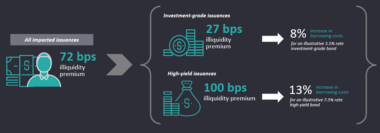
NAM Speaks Out:
NAM Managing Vice President of Tax and Domestic Economic Policy Chris Netram released the following statement:
“At a time of rising interest rates and economic uncertainty, manufacturers cannot afford for the SEC to roil the bond markets arbitrarily. With tens of thousands of jobs at stake, the SEC must act by year’s end to reverse this misguided interpretation.”
NAM Action:
Today, the NAM and the Kentucky Association of Manufacturers are filing two petitions for rulemaking with the SEC seeking to stop the harm this new rule interpretation would cause.
The NAM and the KAM are calling on the SEC to reverse course by clarifying—either by rule or by exemptive order—that Rule 144A issuers are not required to make public financial disclosures. The NAM and the KAM are also seeking emergency interim relief to prevent the new interpretation from taking effect in January.
Background:
- SEC Rule 15c2-11 requires broker dealers to ensure that key information about issuers of over-the-counter equity securities is current and publicly available prior to quoting those issuers’ securities freely.
- SEC Rule 144A allows for resales of securities (primarily corporate debt issuances) to qualified institutional buyers—large financial institutions that own or manage more than $100 million in securities. Retail investors cannot purchase Rule 144A securities. Notably, under Rule 144A, issuers are obligated to make their financial and operational information available to QIBs.
- In September 2021 and December 2021, the SEC’s Division of Trading and Markets issued no-action letters applying Rule 15c2-11 to Rule 144A debt; the new requirements take effect in January 2023. This decision contradicted the historical application of Rule 15c2-11 to OTC equity securities and bypassed important rulemaking safeguards required by the Administrative Procedure Act.
- The NAM has weighed in with the SEC and Congress seeking to reverse this damaging interpretation.
-NAM-
The National Association of Manufacturers is the largest manufacturing association in the United States, representing small and large manufacturers in every industrial sector and in all 50 states. Manufacturing employs more than 12.9 million men and women, contributes $2.77 trillion to the U.S. economy annually and accounts for 58% of private-sector research and development. The NAM is the powerful voice of the manufacturing community and the leading advocate for a policy agenda that helps manufacturers compete in the global economy and create jobs across the United States. For more information about the NAM or to follow us on Twitter and Facebook, please visit www.nam.org.
NAM Hosts Inaugural Manufacturing Legal Summit
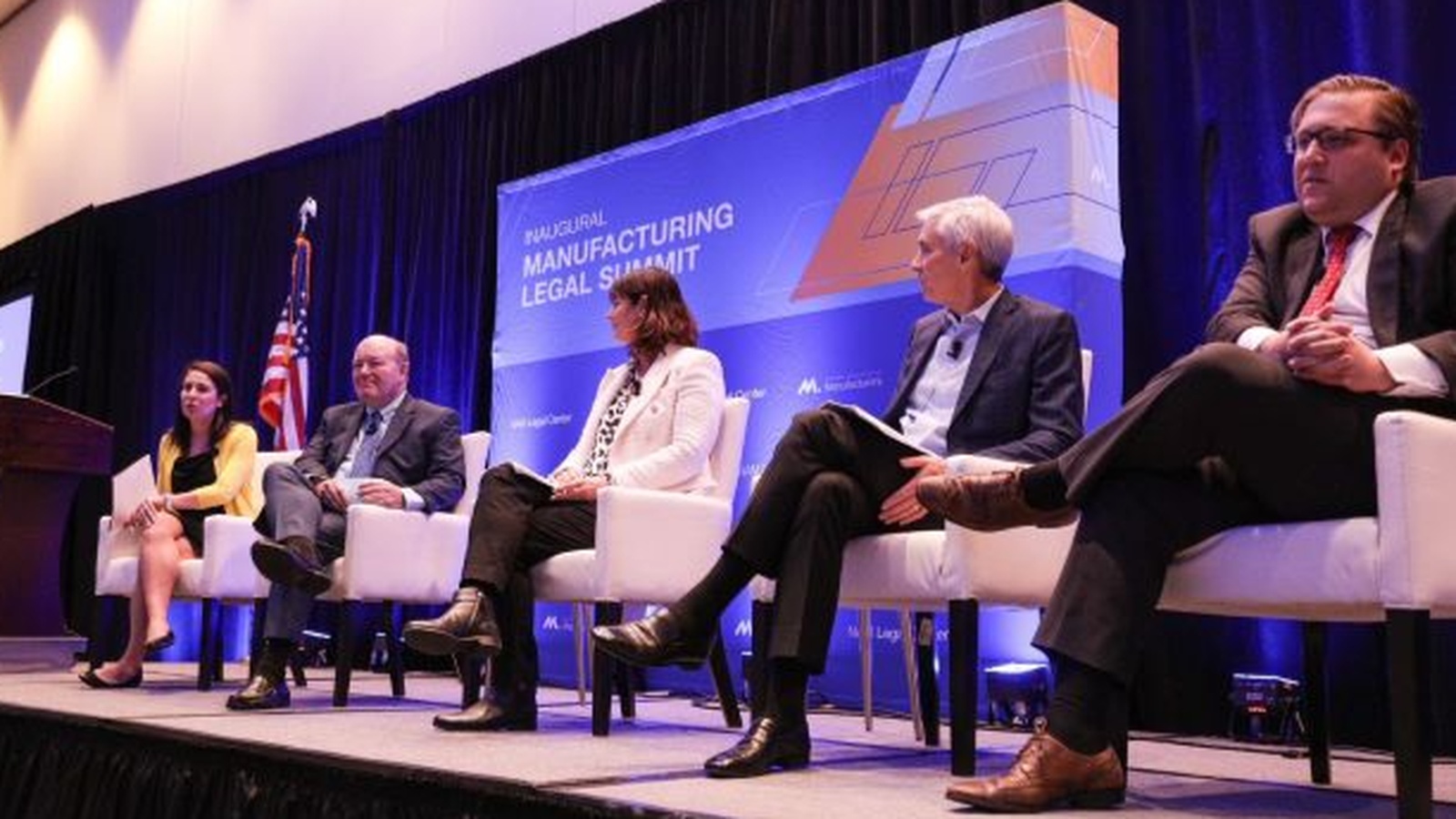
Manufacturers face a minefield of legal and compliance issues every day—and too often, in-house counsel are forced to navigate some of the biggest issues affecting the industry alone.
The NAM’s Legal Center sought to change that dynamic at the first-ever Manufacturing Legal Summit, which took place Nov. 15–16 in Washington, D.C., where in-house counsel from manufacturing companies across the nation had a unique opportunity to convene and learn about the latest pressing challenges across the legal and regulatory landscape.
“The summit offered real-world, practical advice that will help in-house manufacturing counsel deal with their legal and regulatory challenges,” said NAM Chief Legal Officer and Corporate Secretary Linda Kelly.
Kelly and NAM Deputy General Counsel for Litigation Erica Klenicki told us more.
Exploring issues: The summit covered a range of topics, including the following:
- National Labor Relations Board: A session led by NLRB board member John Ring and labor law experts from Fisher Phillips provided critical insights on the priorities and activities of an aggressively pro-labor NLRB, and how manufacturing employers can prepare for the many significant legal changes coming in the weeks, months and years ahead.
- Supply chain: A panel centered around supply chain challenges, featuring the perspectives of GE Appliances’ vice president and general counsel and including an array of experts from the law firm Foley & Lardner, covered issues like supply chain due diligence and drafting contracts to prepare for inevitable supply chain bottlenecks.
- ESG: A panel of experts from McDermott, Will & Emery that also included Brunswick Corp. Executive Vice President, General Counsel, Secretary and Chief Commercial Officer Chris Dekker explored how the ever-evolving concept of ESG is affecting both public and private companies—including what manufacturers should expect from the Securities and Exchange Commission’s forthcoming climate disclosure and human capital management rules.
- Supreme Court: Another session covered the impacts of last year’s Supreme Court decisions and the likely outcomes of this year’s cases on issues of importance to manufacturers and the general public alike.
- Product liability: This panel featured in-house counsel from Johnson & Johnson, The Sherwin-Williams Company and Toyota North America, along with experts from the law firm Shook, Hardy & Bacon, discussing recent efforts by the trial bar to circumvent the traditional limits of product liability law. The panelists laid out the types of bad-faith product lawsuits that manufacturers often face—and how manufacturers should approach them.
- Drugs in the workplace: Especially at a time of legal ambiguity around marijuana, it can be challenging for employers to make and enforce rules about drug use. This session led by workplace legal expert Matt Nieman of Jackson Lewis laid out helpful approaches to creating a modern drug-free workplace.
- Cybersecurity: As cyberattacks against manufacturers rise, it’s important for lawyers to understand their responsibilities around protecting confidential company information and preventing breaches. Thanks to the expertise of representatives from Miller Johnson, a member of the Meritas network, participants learned about these topics through the lens of an attorney’s ethical obligations.
Building relationships: In addition to practical and engaging content, the event also offered participants opportunities to connect with one another and with the NAM legal team.
- “One of the many goals was to build a network, and there was a lot of enthusiasm for that,” said Kelly. “The event also brought greater visibility to the work of the Legal Center and helped show the legal departments of member companies how the NAM can be an effective partner.”
Convening talent: More than 120 participants registered for the event, comprising in-house counsel representing large and small manufacturers from every industrial sector, as well as legal experts from top law firms across the country.
- “This is the first time this group was in a room together,” said Klenicki. “It’s a group that faces a lot of the same pressures, so having everyone in the room together thinking through these issues was extremely valuable.”
A representative reaction: “The event brought together a terrific collection of manufacturing CLOs and senior law department leaders to discuss legal issues of importance to manufacturers,” said Dekker. “The informative and timely content was presented primarily by panels that included outside attorneys and in-house counsel ensuring the advice was actionable and practical.”
An annual affair: The Manufacturing Legal Summit will return Nov. 7–8, 2023, in Washington, D.C.
- “Being in the nation’s capital, where law and policy unfold, hearing from experts on these issues—it’s an exciting experience,” said Klenicki.
NAM Achieves Victory in Proxy Suit

The NAM notched a significant legal victory yesterday when a federal judge vacated the Securities and Exchange Commission’s suspension of a 2020 rule regulating “proxy advisory firms.”
The background: Proxy firms advise institutional investors on how to vote their shares in publicly traded companies, but those firms have long been unregulated and unaccountable.
- In 2020, in large part through the advocacy of the NAM, the SEC finalized a rule increasing oversight of these firms—but in 2021, the SEC’s new leadership announced that the agency would not enforce the rule.
- Suspending the rule without public notice and comment was a violation of administrative law—and the NAM stepped up to challenge this circumvention of the Administrative Procedure Act in court.
The win: Yesterday, the NAM won its case against the SEC in the U.S. District Court for the Western District of Texas. The decision makes clear that the SEC acted unlawfully by suspending the compliance date for the proxy firm rule without following the notice-and-comment procedures required under the APA.
- As the court said in its opinion, “[agencies] do not have the inherent power to stay or delay a final rule absent notice-and-comment rulemaking.”
What’s next: The NAM has also filed suit against the SEC’s 2022 rescission of critical components of the 2020 rule. That case is still ongoing, with oral arguments scheduled for December—but this week’s decision ensures that the SEC will not be able to re-suspend the 2020 rule if the NAM is successful in its challenge to the rescission.
Our take: “Today’s decision is a victory for the rule of law, and the NAM Legal Center was proud to lead this effort for the industry,” said NAM Chief Legal Officer Linda Kelly. “Federal agencies are bound by the Administrative Procedure Act—standards the SEC failed to meet by indefinitely delaying the compliance date for the 2020 proxy firm rule without notice-and-comment rulemaking. Manufacturers depend on regulators to promulgate and enforce reliable rules of the road, and the NAM looks forward to similarly holding the SEC to account in our ongoing case against the agency’s unlawful rescission of the 2020 rule.”
Manufacturers Celebrate Victory in NAM v. SEC
Judge Overturns SEC’s Suspension of 2020 Proxy Firm Rule
Washington, D.C. – Following a decision granting the National Association of Manufacturers’ motion for summary judgment in NAM v. SEC and vacating the Securities and Exchange Commission’s unlawful suspension of its duly promulgated proxy advisory firm rule, NAM Chief Legal Officer Linda Kelly released the following statement:
“Today’s decision is a victory for the rule of law, and the NAM Legal Center was proud to lead this effort for the industry. Federal agencies are bound by the Administrative Procedure Act—standards the SEC failed to meet by indefinitely delaying the compliance date for the 2020 proxy firm rule without notice-and-comment rulemaking. Manufacturers depend on regulators to promulgate and enforce reliable rules of the road, and the NAM looks forward to similarly holding the SEC to account in our ongoing case against the agency’s unlawful rescission of the 2020 rule.”
Background:
The NAM has long called for increased oversight of proxy advisory firms. In July 2020, the SEC issued final regulations to enhance transparency and accountability for proxy firms, a move NAM President and CEO Jay Timmons called a “long-sought, major win for the industry and millions of manufacturing workers.” In October 2020, the NAM filed a motion to intervene in ISS v. SEC (ISS’s attempt to overturn the rule) in support of these reforms.
In June 2021, the SEC announced that it was suspending enforcement of the 2020 rule; the NAM filed suit against the SEC in October 2021 challenging this unlawful suspension. The U.S. District Court for the Western District of Texas today issued an opinion granting the NAM’s motion for summary judgment and vacating the SEC’s suspension of the rule. As the court explained, “[Agencies] do not have the inherent power to stay or delay a final rule absent notice-and-comment rulemaking.”
In July 2022, the SEC rescinded critical portions of the 2020 rule, a move that Timmons said “epitomizes ‘arbitrary and capricious’ rulemaking.” The NAM has filed suit challenging the rescission; a summary judgement hearing in NAM v. SEC is scheduled for December 9, 2022.
-NAM-
The National Association of Manufacturers is the largest manufacturing association in the United States, representing small and large manufacturers in every industrial sector and in all 50 states. Manufacturing employs more than 12.8 million men and women, contributes $2.77 trillion to the U.S. economy annually and accounts for 58% of private-sector research and development. The NAM is the powerful voice of the manufacturing community and the leading advocate for a policy agenda that helps manufacturers compete in the global economy and create jobs across the United States. For more information about the NAM or to follow us on Twitter and Facebook, please visit www.nam.org.
Kigali Ratification a Win for Manufacturers
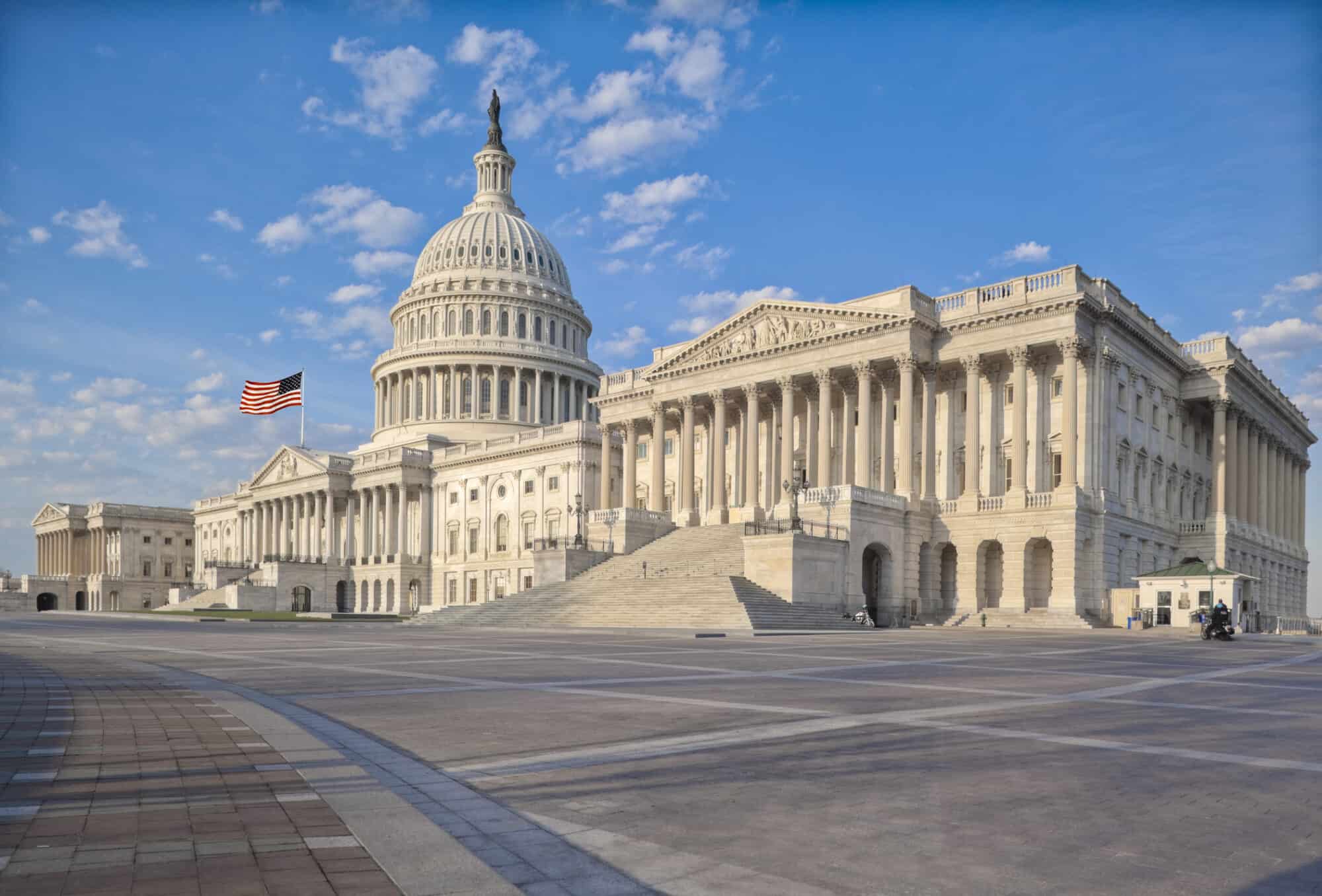
The Senate voted yesterday to ratify the Kigali Amendment—an international greenhouse gas–reduction accord that is more meaningful than any the U.S. had agreed to before. Long advocated by the NAM, this ratification is a major step forward for manufacturers and their ability to compete effectively and sustainably.
A climate-action model: In a strong bipartisan 69–27 vote, the Senate approved the amendment, a change to the 1987 Montreal Protocol that phases down the use of hydrofluorocarbons (commonly used refrigerants) in favor of more efficient next-generation alternatives.
- The measure, which the NAM called for in its climate change roadmap, “The Promise Ahead,” “could help avoid a half-degree Celsius of global temperature increases by the end of this century,” according to POLITICO Pro’s E&E News (subscription).
- The ratification builds on a move for which manufacturers also pushed, the 2020 legislation requiring the Environmental Protection Agency to issue rules to phase down nonessential HFCs by 85% by 2036.
Manufacturers approve: Many manufacturers were delighted by this move. “Trane Technologies applauds senators on both sides of the aisle for voting to ratify the Kigali Amendment,” Trane Technologies Chair and CEO Dave Regnery told Input.
- “In addition to creating 33,000 U.S. jobs, stimulating $12.5 billion in new investment in the U.S. economy and boosting U.S. exports by 25%, ratifying Kigali aligns with our bold commitments to reduce emissions through sustainable innovation.”
Accountability for China, India: Critically, the legislation fortifies “our global leadership and put[s] the U.S. in a position to hold countries like China and India accountable,” NAM Vice President of Energy and Resources Policy Rachel Jones said in a communique to Congress—which was quoted by Environment & Public Works Committee Chairman Sen. Tom Carper (D-DE) on the Senate floor Tuesday.
- The amendment will also “protect American workers, grow the economy and improve our trade balance all while encouraging further innovation to strengthen America’s technology leadership,” Jones wrote.
Inside the NAM’s advocacy: “We were able to leverage our longstanding policy experience, strategic partnerships and our depth of relationships in the Senate to adeptly navigate the ever-changing and challenging politics,” said NAM Senior Vice President of Policy & Government Relations Aric Newhouse.
- “Ultimately, the NAM’s support and long-term engagement was able to shepherd this crucial priority for manufacturers across the finish line in a bipartisan way that doesn’t force a false choice between environmental protection and economic growth.”
The last word: “This action proves that if we work together—if we rise above politics and partisanship and focus on solving problems—we can make our vision of a brighter tomorrow into reality,” Jones said in a statement.
What Manufacturers Need from Regulatory Reform
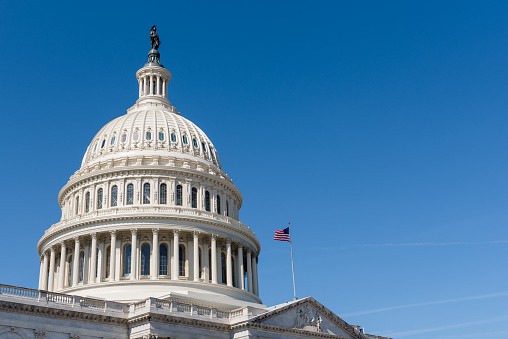
While smart regulations can enhance manufacturers’ competitiveness, there are far too many cases of unwieldy or unnecessary rules getting in their way. That’s why the NAM is standing up for regulatory reform and providing policymakers with a list of solutions to pursue today.
The challenge: The annual regulatory cost burden for an average U.S. firm represents 21% of its payroll, forcing manufacturers to divert resources away from important investments. For smaller manufacturers, the burden can be disproportionately painful, creating barriers to growth and development.
Our work: At the NAM, we’re advocating for a predictable regulatory agenda that is based on science and facts and that offers flexibility for innovation.
- The NAM’s agenda, contained in its policy blueprint Competing to Win, seeks to combat the fundamental problems in our outdated regulatory system.
- That includes ensuring that regulations focus on outcomes and rely on data; improving regulatory analysis; minimizing unnecessary burdens; strengthening industry outreach; preserving the ability of companies to grow; and reducing the abuse of our legal system.
What we’re saying: “Manufacturers in the United States should be able to grow, compete and win without being stymied by outdated and unnecessary regulations,” said NAM Director of Regulatory, Tax and Domestic Economic Policy Alex Monié.
- “We are proud of the work that the NAM has done to reduce the burden on businesses while also protecting the men and women who make things in America.”
- “We are committed to pressing forward so that every manufacturer can support their workforce, participate in market innovation, contribute to their communities, promote competitiveness and advance U.S. leadership.”
Learn more: Check out the NAM’s full regulatory reform agenda in Competing to Win—a strategic blueprint for the policies that manufacturers in America need to compete with the rest of the world.
Congress Leans into Electoral Count Reform
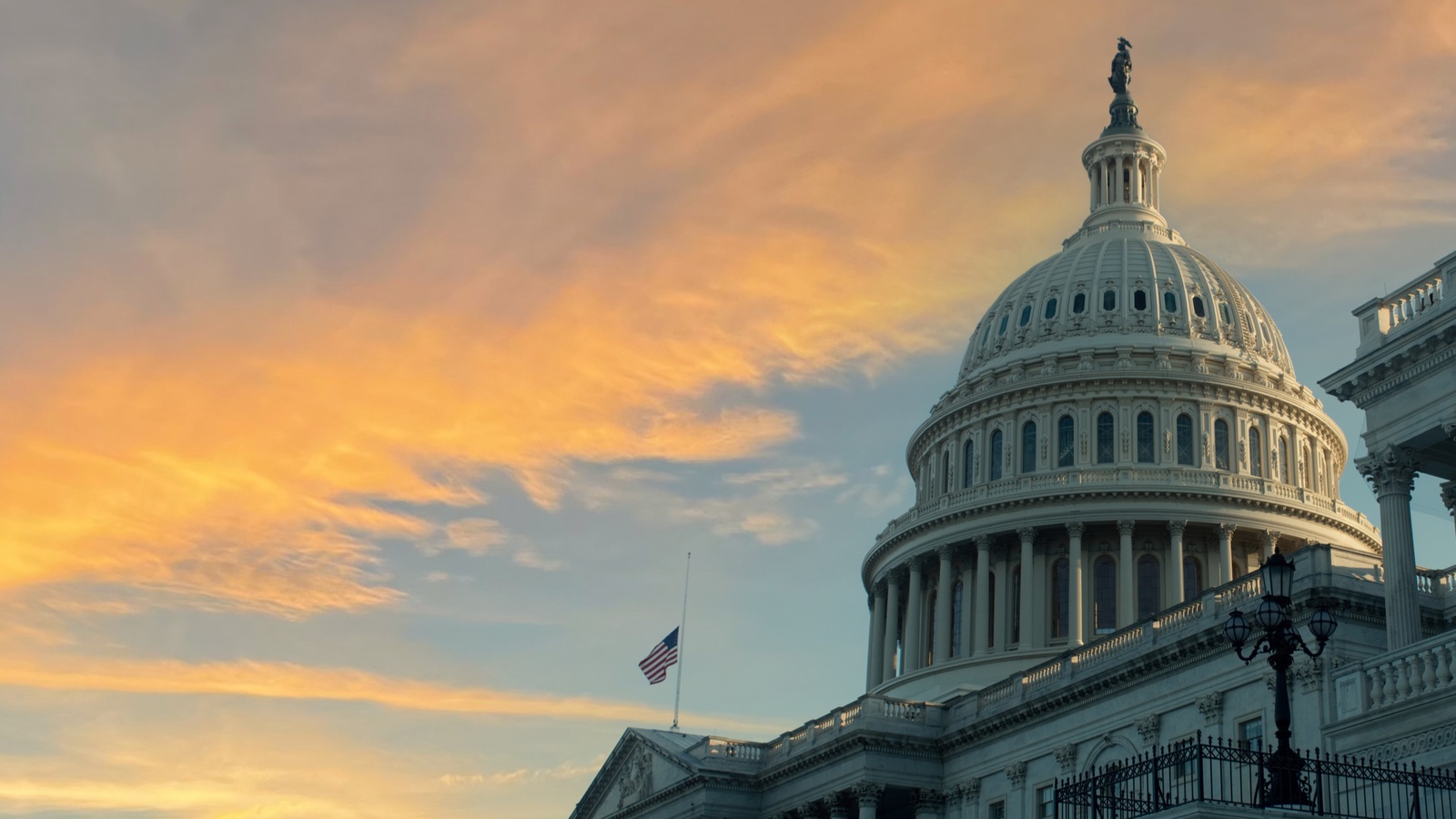
Following the events of January 2021, the processes for counting electoral votes has received renewed attention—and some members of Congress are working together to fix it.
The background: The law that governs the counting of electoral votes following a presidential election, called the Electoral Count Act, was written in 1887.
- Over the course of more than a century, the law has remained the same, even as ambiguities have caused conflicts and upheavals—most notably after the 2020 election.
- In the past two years, a bipartisan group of U.S. senators, led by Sens. Joe Manchin (D-WV) and Susan Collins (R-ME), have come together to develop the Electoral Count Reform Act, which is intended to remove ambiguities around the counting of electoral votes.
The proposal: While the ECRA is still being drafted, a few key provisions have been discussed. For example:
- The ECRA would clarify that the vice president’s role in vote counting is ceremonial, and that he or she is not empowered to throw out or change any state’s electoral votes.
- The bill raises the threshold for members of Congress to object to a state’s slate of electoral votes.
- Certain versions of the bill contain provisions that would increase election security, including by increasing penalties against individuals who threaten election officials.
- The bill would make clear that state legislatures cannot override the popular vote in their states or throw a state’s electors to someone other than the candidate chosen by their voters.
- The bill would also clear up ambiguities about presidential transition funds, ensuring that these funds can be disbursed to both candidates in the event of a disputed election in order to prevent delays.
Where we are: The current proposal has 17 cosponsors and is bipartisan. It has been through a hearing in the Rules Committee in the Senate, and it seems likely that some form of the ECRA will be considered this fall.
Our take: “The National Association of Manufacturers supports a clear, secure democratic process that doesn’t confer any partisan advantage and reduces opportunities to exploit ambiguities in the law,” said NAM Chief Legal Officer Linda Kelly. “A stable democracy is good for manufacturers and good for the world. That’s something we can all agree upon.”
NAM Files Lawsuit Against SEC Over Proxy Rule Rescission

The U.S. Securities and Exchange Commission has rescinded critical components of a landmark 2020 rule regulating so-called “proxy advisory firms”—and the NAM is fighting back in court.
The long road here: In 2020, after years of NAM advocacy, the SEC finalized a major rule designed to combat proxy firms’ errors and conflicts of interest.
- Proxy firms influence publicly traded companies by recommending how institutional asset managers should vote in corporate proxy contests, often without any accountability.
- The 2020 rule required proxy firms to engage with public companies and their investors, and it subjected the firms to the SEC’s anti-fraud standards.
The about-face: Beginning last year, however, the SEC’s new leadership has worked to undermine the rule, including by refusing to enforce it—an unlawful decision the NAM opposed in court. Last week, the SEC officially rescinded many of the rule’s critical reforms.
The response: The NAM has filed a lawsuit against the SEC to preserve the 2020 rule. Our complaint argues that the SEC’s actions are “arbitrary and capricious”—and that the 2022 rescission should be overturned.
The issue: Federal agencies are required to articulate a reasoned explanation for making a new policy decision—especially when that decision is based on the same facts but reaches a different outcome than a recent rule.
- In this case, the SEC finalized a compromise rule in 2020 based on a decade of bipartisan research, analysis and discussion—and no new evidence has emerged since 2020 given that the SEC prevented the rule from taking effect. So, the agency’s about-face “epitomizes ‘arbitrary and capricious’ rulemaking.”
What we’re saying: “Manufacturers depend on federal agencies to provide reliable rules of the road, and the SEC’s arbitrary actions to rescind this commonsense regulation clearly violate its obligations under the Administrative Procedure Act,” said NAM Chief Legal Officer Linda Kelly. “The NAM Legal Center is filing suit to preserve the 2020 rule in full and protect manufacturers from proxy advisory firms’ outsized influence.”
